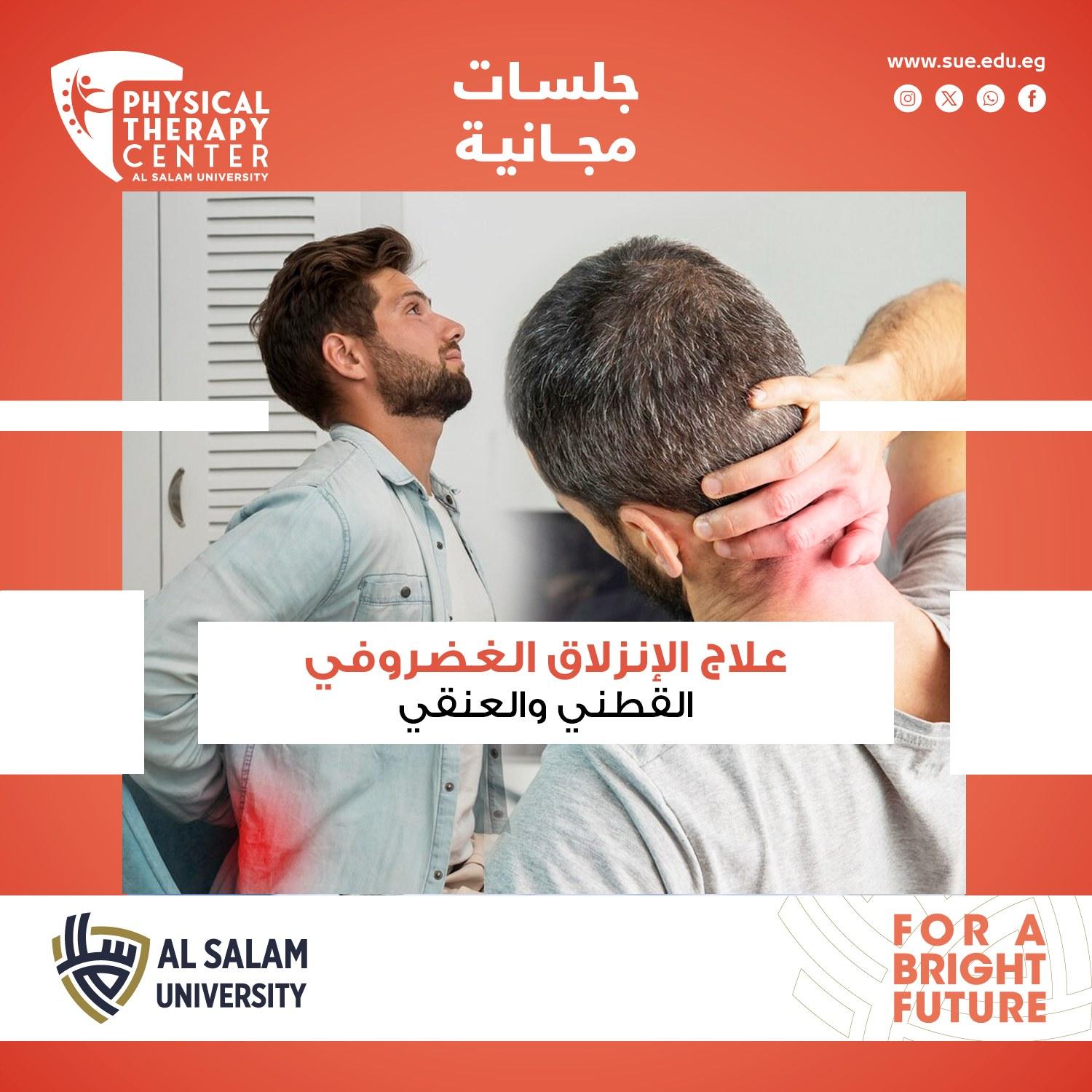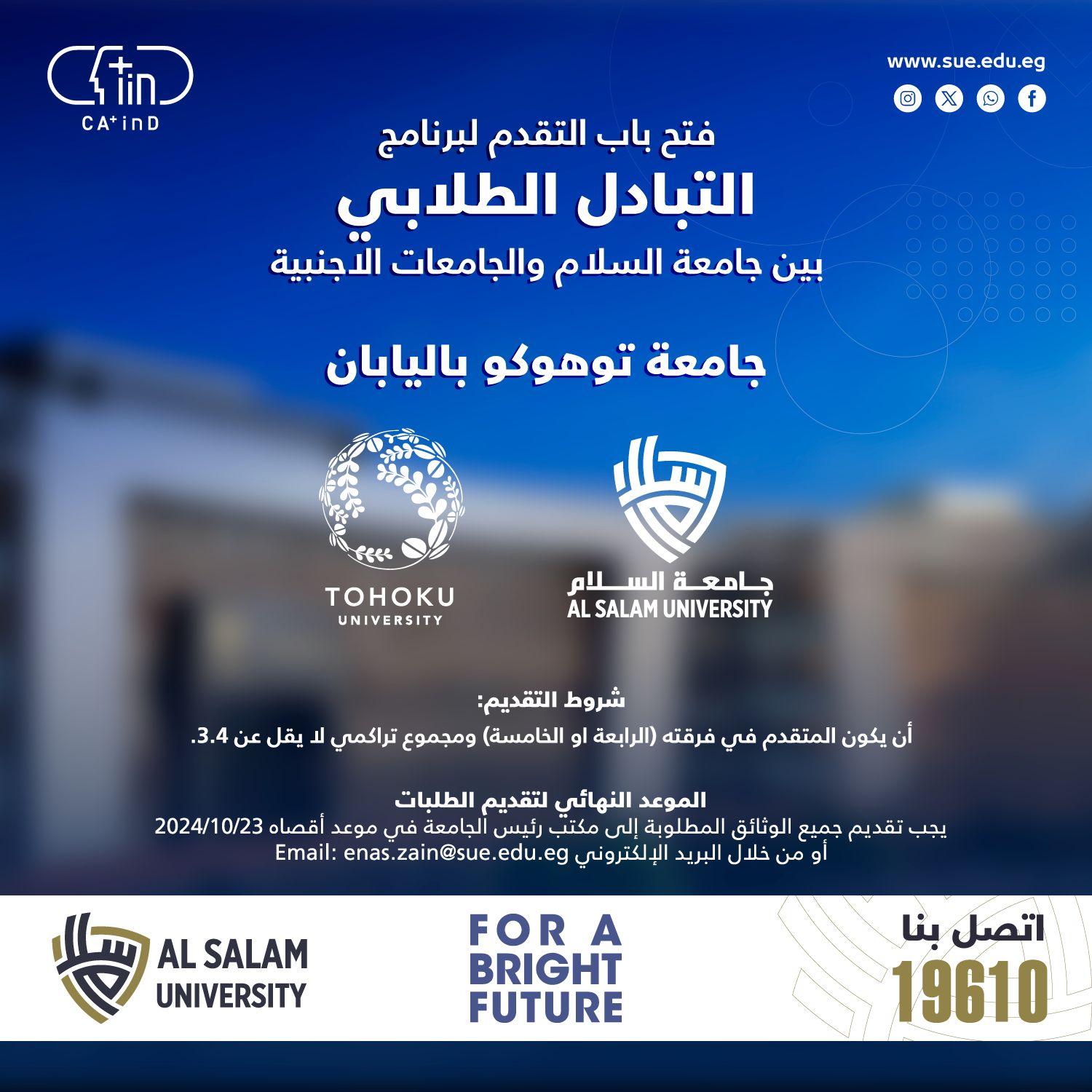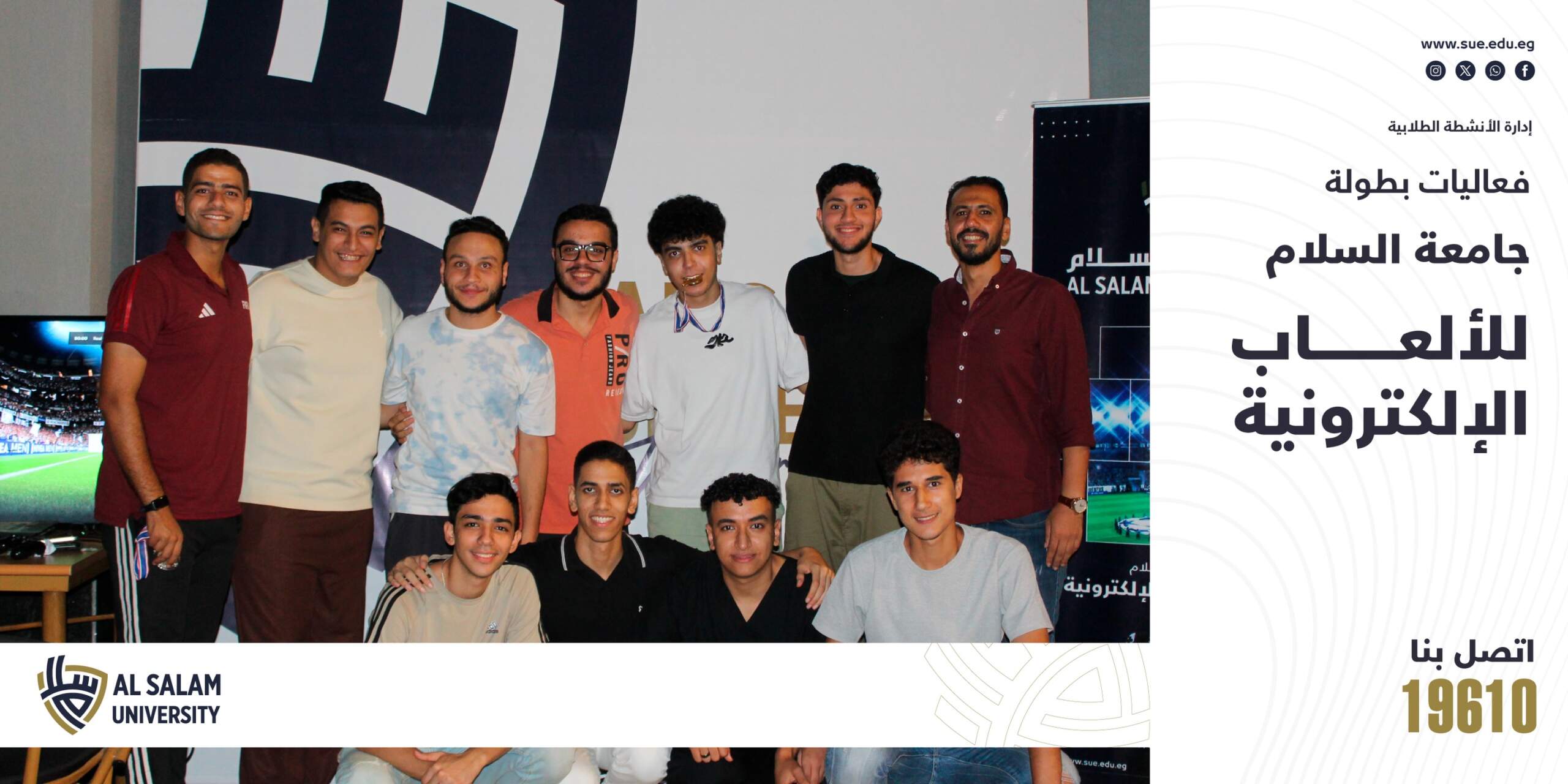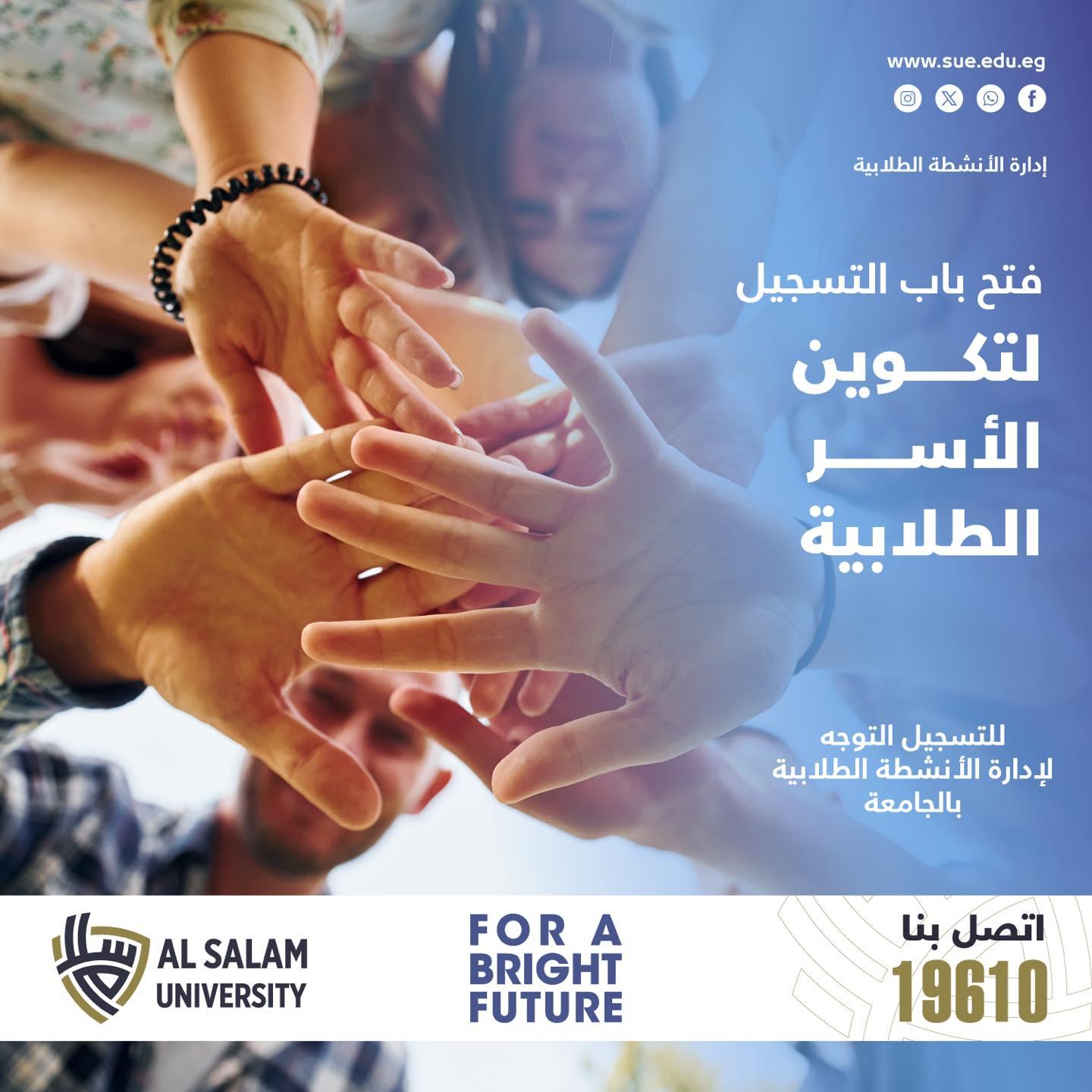Welcome to the electronic portal of Al Salam University Library.
University Library
Knowledge and Scientific Research Center at our university.
Al Salam University Library was established to be a beacon of science and knowledge. The library includes a wide range of educational and research resources to serve students, faculty members, and researchers.
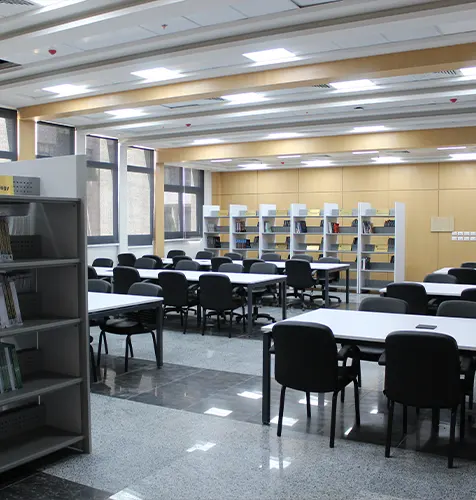
Objectives , Mission and Vision
We strive for excellence and inspire creativity
1. Building and developing knowledge exchange services for university employees and community service.
2. Improve the effective development of information sources that correspond to the needs and aspirations of beneficiaries.
3. Raise the efficiency of institutional performance by ensuring comprehensive quality standards.
4. Achieving knowledge excellence through cooperation and integration with the authorities to activate effective investments and partnerships.
5. Enhance the experience of library beneficiaries and provide an attractive environment to meet educational and research needs.
A community partner in an effective academic context that facilitates self-access to information sources and brings researchers together in an attractive environment that encourages creativity and the advancement of knowledge
A global platform that promotes innovation and knowledge exchange and adapts technologies to serve the educational framework, scientific research, and society with excellence and professionalism.
Library Structure
Library Structure
Our library is designed to provide a comprehensive and accessible learning environment for students and faculty.
It features distinct sections for research materials, academic journals, and multimedia resources, all organized for easy navigation. With quiet study areas, group workspaces, and advanced technology, the library supports a variety of academic needs and promotes an engaging and productive study atmosphere.
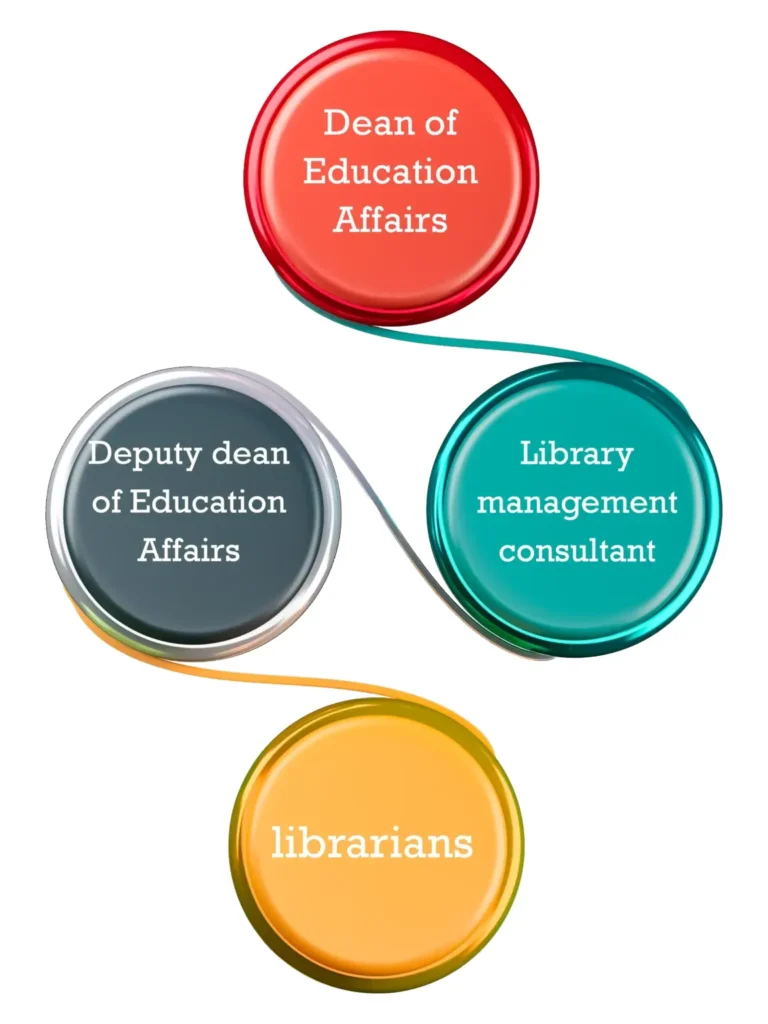
Guidelines and instructions for using the library.
- Not to enter the central library without showing the university student card.
- Close the mobile phone.
- Maintaining the cleanliness of the library.
- Commitment and keeping calm.
- Do not move chairs from their original places.
- Pull and return the chairs to their places quietly.
- Do not eat food and drinks inside the library.
- It is forbidden to use any means of photographing inside the library.
- The library is used for reading and scientific research only.
- Leave books on the tables and do not return them to the shelves.
- Maintain the safety of books when handling or reading them.
- Throw the trash in the trash can and do not leave it on the tables or on the floor.
Classification and ranking system
The information containers on the shelves are arranged according to their own numbers (classification number) according to their topics according to the Dewey Decimal Classification system for classifying library holdings, which divides human knowledge into ten main sections, and the information containers on the shelves are arranged according to their own numbers (classification number), which divides human knowledge into ten main sections, each of these sections has ten branches, and each branch has ten other branches... Thus, in addition to adopting the first three letters of the author's family and the first letter of the title, or the title in the absence of an author.
Here are the ten origins of the Dewey Decimal System
| numbers | Definition | numbers | Definition |
|---|---|---|---|
| Purely natural sciences (theoretical) include mathematics, astronomy, physics, chemistry, geology, paleontology, Anthropology, Botany, Zoology. | 500-599 | General knowledge includes computer and bibliography, libraries, encyclopaedia’s, museums, journalism. | 000-099 |
| Applied (theoretical) sciences include mathematics, astronomy, physics, chemistry, geology, paleontology, Anthropology, Botany, Zoology. And technology includes medicine, engineering, agriculture, Home Economics, Business Administration, Industries, Construction Engineering. | 600-699 | . Philosophy and psychology include ontology, psychology, ancient and modern philosophy, logic, ethics. | 100-199 |
| Fine Arts include city planning, architecture, artistic and engineering painting, oil painting, photography, sports and sports games. | 700-799 | Religions include: the Islamic religion and other religions. | 200-299 |
| Literature and poetry include Arabic literature, poetry, story, theatre, letters, speeches, memoirs, prose. | 800-899 | Social Sciences include statistics, politics, economics, law, Public Administration, Social Welfare, Education, Transportation, Customs, and traditions. | 300-399 |
| History, geography, translations include geography, excursions, ancient and modern history, biographies of people. | 900-999 | Languages include Arabic and all other languages. | 400-499 |
If the book has a rating number of 616.723, its subject can be known, as follows:
600 means that the book is in Applied Science.
610 means that the book is specialized in medicine.
616 means that the book deals with diseases and their types.
616.7 its meaning is that the book deals with the topic of diseases of the musculoskeletal (motor) system.
616.72 it means that the book deals with the topic of joint diseases.
616.723 means that the book deals with rheumatic diseases.
The system used in the library.
The future system of library management is the most widespread system in the libraries of Egyptian universities and the first version of the system began in 1998, then an advanced system of it was issued in 2005 in line with the international standards of library management systems, the system was applied in 2007 in all Egyptian public universities to create the first unified index of Egyptian universities and this system is being applied in Egyptian schools to establish a library Union for Egyptian schools.
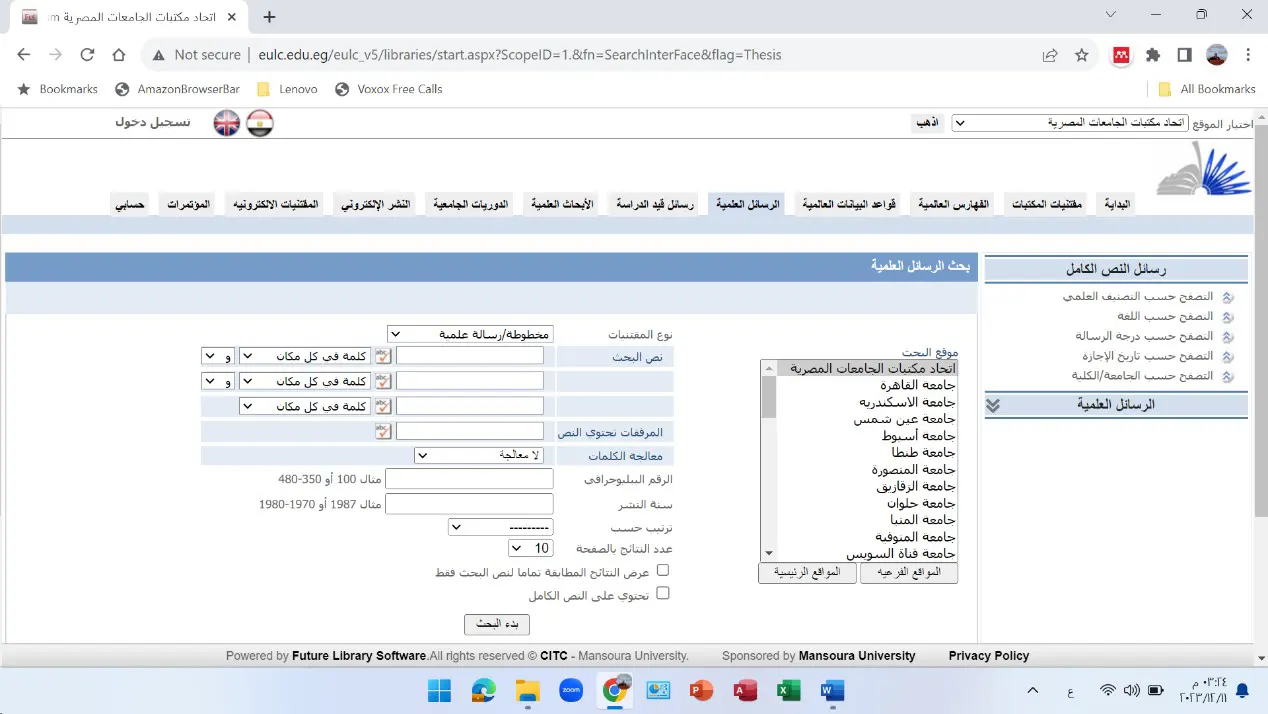
System components
Search - cataloguing - collections management – periodicals – borrowing – Digital Repository – reports – ILL – materials booking – academic booking – archive – reference service – provisioning – reference lists – services – system management - Mobile Module.
Search
* Use multilingual spelling correction to correct words spelling when searching
* Full support for the characteristics of the Arabic language in search and retrieval such as whispers, antecedents, suffixes, search by convergence, search by synonyms such as women equal to a woman and a woman, search by inflections and various forms of writing the word such as go equals gone, gone
* Support for Boolean search and the possibility of modifying search criteria in addition and deletion through System Administration
* Automatically linking the library’s holdings to freely available sources on the internet to provide the possibility of viewing the cover image, summary and browsing the full text of the information source
Indexing
* Full support for Mark format, the possibility of importing and exporting recordings in Mark style and in text form
* There is no maximum length limit for the recorded text in any of the Mark Fields
* Multilingual Unicode support and spell correction support during vessel indexing
* The presence of a classification wizard to help in the classification of Dewey and Congress
* The possibility of indexing all library collections at once by importing indexing from 400 international libraries
* The possibility of creating indexing templates in which the required fields and their default values are specified
* The possibility of dealing with the Row MARC for the exchange of bibliographic recordings
* The ability to add a crown/modify an existing crown from Mark Fields for a large group of recordings at once with the “comprehensive bibliography modification “feature
* The possibility of printing the index card of the book from the system, whether by title, by author, or a card by topics
* Automatic detection of duplicate recordings with the possibility of combining them
* The registration goes through three stages of quality control: draft, sent for approval, approved and the date of modification of the registration can be traced
* Local indexing program: through which the vessels can be indexed without the need to connect to the internet, and after connecting to the internet, the recordings that have been indexed can be uploaded, and it can be downloaded from the download link available on the system
* RDA system support: it is now possible to browse search results by Article Type, topics, language, publisher, publication date, place of publication, authors and browse by the body/conference producing this version.
* QR Code system support: the system supports QR code technology and can be used for searching, retrieving, borrowing, inventory, and other library-specific operations.
Acquisitions management
* Entering and modifying the data of the holdings and determining the extent to which they are subject to borrowing, inventory, search, printing vertical coding
* Electronic inventory of collectibles and management of maintenance and binding operations
* Library Maps support for accessing collections: the system supports entering the library map and locating the book on the shelf inside the library.
Periodicals:
* Registration of periodicals subscriptions and tracking of payments
* Anticipate the arrival of patrols, identify the overdue numbers, and extract the necessary reports by supplier or patrol
* Register the articles available in each issue, enter their summary, and the possibility of uploading the full text and attaching it in an electronic form.
Borrowing
* Integration with any local systems for Personnel Affairs, Student Affairs and faculty members ‘ affairs, if any.
* Three-dimensional borrowing powers depending on the location, beneficiary category and type of vessel.
* Manage the borrower’s account, calculate fines and payments.
* Extract reports of borrowed, borrowed, and overdue items.
* Give the borrower a password to log in to his page and take advantage of the services available to him
* Possibility of interlibrary borrowing (libraries registered on the system as well as libraries from outside the system)
* RFID system: contributes to the management of the Electronic Library and provides the function of self-borrowing and quick inventory of holdings and works as an alternative to barcodes
The digital repository
* Manage electronic collections and periodicals and record a report on the rate of use for them
* The possibility of converting electronic collectibles to Browsing style to browse and reveal the text inside them to search the full text
* Support for entering and viewing archived broadcasts of lectures and courses
Academic booking
* The possibility of reserving some library collections for a course at the request of faculty members, and special access rules for these collections are determined for students these curricula and the possibility of borrowing or reserving them from the library.
Booking materials
* The possibility of booking the physical resources in the library, such as the projector, lecture halls, datasheet or laptop, and the consequent reservation of special equipment in the library and equipment for the reserved resources, such as the processing period and the cleaning period.
* The items available for booking are selected, or groups of these items are formed, then the reserved items are delivered, and after completion, they are returned to the library.
Acquisition
* Create new budgets, orders and identify the vessels to be purchased, and update the budget file according to financial transactions so that it is easy to know the budget amount, disbursement and balance at any time
* Register purchase suggestions under any budget
* A database of suppliers with their registered addresses, money transfer addresses, return addresses, and all financial transactions are recorded, including invoices, financial arrears, and the status of orders.
Reports and statistics
* A detailed report and statistics on all library activities, the activities of employees and borrowers, and follow-up on the development of the activity.
Archives
* Managing and archiving the library’s Holdings, through which it is possible to add and edit a document, add and edit its own documents, and search for a document or a document in a document
* Reports for registered documents and documents can be extracted
Subsystems
Scientific periodicals management system
Through it, a special website can be created for each periodical for electronic publication that allows:
* Receiving, judging and publishing scientific research
* Publishing the news of the periodical, contact data and publication policy of the periodical
* Facilitate communication with arbitrators and researchers electronically
* Control of the arbitration elements of the league
* Control the alert messages that are sent to researchers and referees and manage the Journal when the research status changes
* Ability to download the system directory from the link
Scientific Conference Management System
Through it, a special website can be created for each conference that allows:
* Receiving, judging and publishing scientific research
* Publishing the news of the conference, contact data and publication policy of the periodical
* Facilitate communication with arbitrators and researchers electronically
* Control of the conference’s arbitration elements
* Control the alert messages that are sent to researchers and arbitrators and manage the conference when the research status changes
* Ability to download the system directory from the link
System services
* Library News management by the content management manager
* The presence of an internal mail to exchange messages between the team and technical support
* Document delivery service for researchers, follow-up of applications and implementation
* Reference services: technical support voice/ image / text for visitors and users, frequently asked questions, ongoing briefing
Portal aggregator search management
* The possibility of doing a complex search in all purchased global databases with Connectors ready for interconnection with the most famous databases such as (Science Direct, EBSCO, Springer, IEEE, OVID, IOP, ISI, ProQuest, Jstor, Wiley, Gale, IOP, Wilson Humanities, CAB, Global Health, ERIC,….)
* Extract reports and statistics for each database and compare full-text downloads by database and monthly traffic rate
System management
* Manage the permissions of users / groups and link the permissions to (IP / MAC)
* Manage infinite tree branches for library sections and specify the link for each section according to the authority
* Sector management: such as the establishment of sectors that bring together different colleges, such as the medical sector, to facilitate research operations
* Global database management and allows the possibility of adding Z39. 50 servers
* Definition of new Mark Fields and modification of Mark Field data
* Amend and add sub-classifications in the reference list of the Dewey Decimal Classification, and the Congressional classification
* Create backup copies of data
* Control of search criteria and settings and reports
* Future API: allows integration between other electronic systems in the institution, such as personnel and student affairs systems, if any, according to international standards
* Facebook integration: login to the system using the Facebook account, and the possibility of making comments on the content available to the beneficiaries.
The most important participants in the system
All Egyptian government universities-Egyptian General Authority for mineral wealth-Arab Organization for administrative development-Unaiza colleges in Qassim-Kingdom University in Bahrain-University of Applied Sciences in Bahrain-Nahda Unwomen.y-Derayah University-Sinai University-Al-Azhar University-the Theba Academy of Science and Technology-Alexandria Academy of accounting Sciences-Higher Technological Institute on the tenth of Ramadan-Higher Institute of Computer Science and management technology in Sohag Arab Academy of banking Sciences-Higher Institute of architecture-October Institute of architecture-Obour institutes-Faculty of Islamic Studies at the University of Pristina in Kosovo – Federation of Egyptian school libraries-women Memory Foundation-National Council for women .
Services provided by the library to the beneficiaries.
1-loan services
Faculty members, students and administrators can benefit from the services provided by the library from external lending and internal review lending is one of the most important public services provided by libraries and university information centres, one of the important indicators of the effectiveness of the library and its relationship with the community of beneficiaries, and a good criterion to measure the effectiveness of libraries in providing:
Internal review-external loan-loan renewal-follow-up-booking
2-External loan service:
Faculty members, students and administrators can benefit from the services provided by the library from external lending and internal review, lending is one of the most important services provided by libraries and university information centres and one of the important indicators of the effectiveness of the library and its relationship with the community of beneficiaries, and a good criterion to measure the effectiveness of libraries in:
Internal review-external loan-renewal of loan-reservation of office materials.
3-External loan rules:
- Limit the number of books that are loaned to an individual at one time, which is not more than two books, and the time period of the loan is also determined, which is not more than a week renewable after notifying the loan officer a sufficient period.
- In case of delay from the scheduled date of Return of the collectibles, a notification is sent to him to return the books within 7 days or he is denied borrowing.
- The release of a party for faculty members or an employee of the university is released only after making sure that there are no belongings in his possession.
- In case of loss of the book, the borrower is assigned to bring a replacement copy or pay the price of the book by 300% in cooperation with the procurement department to determine the price of the book or to search for its value in the case of gift books, even if they are part of a collection or Encyclopaedia, the price of the entire collection and the value of administrative expenses are paid.
- Collectibles that are not on loan: (encyclopaedia’s, dictionaries and references – periodicals – scientific theses-rare books-manuscripts and papyri – single-copy books-maps, atlases, annual reports, statistics and graphs – non-paper information vessels such as tapes, magnetic disks, scientific slides, microfilm and microfiche) .
4-Reference Services:
The Reference Service is divided into two main sections:
A-direct reference services, including answering reference questions submitted by beneficiaries directly. And guide the visitors and guide them to the places they need in the library. Education and training of beneficiaries on the use of various references. Provide the appropriate references to the researcher and prepare bibliographic lists for him if necessary.
B-indirect reference services, including selecting the appropriate references for the library and providing them to the Department. Arrange the references on the shelves and return the references to their correct potential. Evaluation of the available references and the reference service provided.
5-Ongoing briefing services
The library informs about the newly arrived scientific materials that have been classified and catalogued by displaying them in a special place.
6-electronic services
The library provides access to the Global Information Network ” Internet” to search for information and allows researchers to make an account on the knowledge bank.
7-photocopying and reproduction service
It is only for the library’s collections, such as books and letters, provided that the allowed percentage is considered, which is in accordance with the university library regulations and the protection of intellectual property rights.
8-preparation of bibliographic lists
Whether these lists are with the names of authors, titles, or topics, and printed on paper or digitally copied so that they are available to library visitors.
Library
Library photo gallery
Recent Articles
تقديم "جلسات مجانية" في مركز العلاج الطبيعي بجامعة السلام بمصر
فتح باب التقديم لبرنامج التبادل الطلابي مع كلية طب الأسنان جامعة توهوكو في اليابان
نظمت إدارة الأنشطة الطلابية بطولة ألعاب إلكترونية (FIFA)، كما شهدت البطولة أجواء رياضية وحماسية بين الطلاب
تعلن إدارة الأنشطة الطلابية عن فتح باب التسجيل لتكوين الأسر الطلابية.

